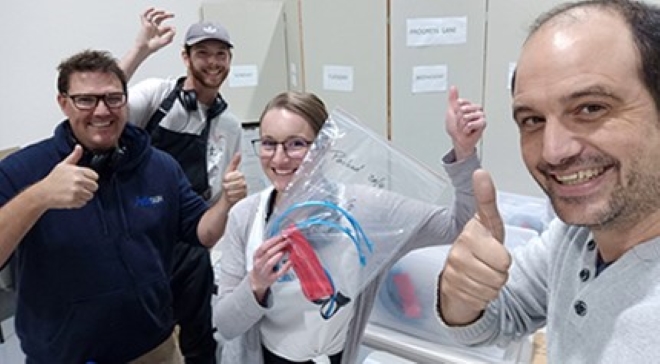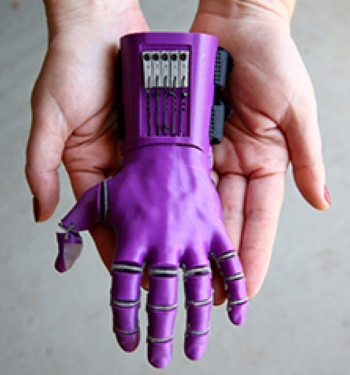Meet the Phillip Island man delivering free 3D printed hands to the world
Phillip Island based engineer, Mat Bowtell, made an unusual choice after he was retrenched from the automotive industry in 2017 – he decided to work for free.

Mat now designs and manufactures assistive hands and fingers for children and adults around the world for free through his charity organisation, Free 3D Hands.
Traditionally manufactured prosthetic hands, which children outgrow quickly, can cost as much as $20,000, making them inaccessible for many people.
Through his own ingenuity and the generosity of donors, Mat has been able to make thousands of assistive devices using 3D printing technology.
“Our fundamental belief is that anyone who’s born with a limb difference shouldn’t have to spend a cent on something that’s going to put a smile on their face and allow them to try things they’ve never done before,” he says.
It’s this innovative spirit (and a pivot to face shield production in 2020) that led to Mat taking home the Regional Development Victoria Leadership and Innovation Award at the 2020 Victorian Regional Achievement and Community Awards.
Mat had always had an interest in bionics, going back to his university days where he studied mechatronics while on an exchange program in Japan.
“While I was in Japan, I had an opportunity to test and trial a one-million-dollar arm. I was amazed by the technology, really blown away by it. But part of me was saddened it wouldn’t be accessible to a majority of people around the world that could benefit from it,” he says.
He was working as a Senior Engineer at Toyota when he decided to revisit this passion.
“In 2014, we were told Toyota would be closing down operations in Australia and we would be made redundant in 2017. During that three-year wind down phase at Toyota, I wanted to focus on something positive with my engineering skills.”

Things started small. Mat made one hand for a boy from Newcastle using the 3D printer he had at home.
“To receive photos of him with the hand, the smile on his face. That moment changed my life. It became an addiction and I started making hands for children across Australia and around the world,” he says.
“Once I left Toyota, my wife and I agreed I would spend the next two years building up Free 3D Hands and live off my redundancy payout. We became a registered charity after a year and a half and now we’re able to do this full time.”
Integral to the growth of Free 3D Hands has been the location Mat chose to be based from.
“I grew up on Phillip Island and moved to Melbourne for university and work. When I finished at Toyota, I moved back because I was craving the tight-knit community atmosphere we have down here,” he says.
Mat and the team quickly leased a large factory on the island, running on the faith that they could find a way to keep producing the free hands.
“Honestly, we wouldn’t have survived if we weren’t based in this community. Lots of locals have donated and offered to volunteer. Our RSL organised a huge fundraiser to help us get solar panels and two Tesla power walls as even the slightest interruption to the power supply means any parts printing have to be discarded and reprinted. Then Gippsland Solar chipped in and installed them for us at minimum cost – 60 per cent of the panels were donated.”
The unique circumstances of 2020 and the coronavirus pandemic offered Free 3D Hands an opportunity to shift gears.
“Just like everyone else around the world, I watched the news and was shocked by what was happening. I wanted to be part of the solution, so we decided to pivot. We shifted a portion of our 3D printers to produce face shields for frontline health workers,” says Mat.
“The economy in Phillip Island is heavily reliant on tourism, so it’s been a tough year for our businesses and workers. We were able to employ people who had been stood down from their jobs in the local community. We had chefs operating our 3D printers. We had night shift workers coming in. It was so rewarding for all of us to do something productive for frontline workers.”
Reflecting on receiving the Regional Development Victoria Leadership and Innovation Award, Mat’s answer is simple: “Our mission is to make something that is better than anything that currently exists and make it accessible to those in need. I’m grateful I’ve been able to sustain this and make it my fulltime job. This has only been achievable through the awards we’ve won - like this one - and the supporters we’ve garnered on the way.”
For more information go to the Free 3D Hands website.